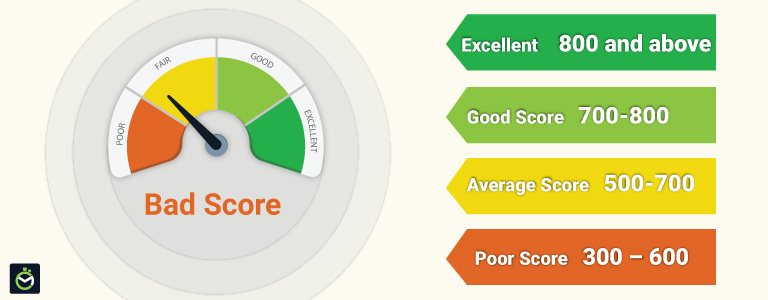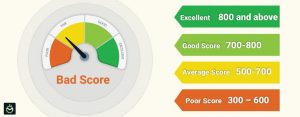Bad Credit Score: What is it? How Can You Determine it?

According to the Consumer Financial Protection Bureau (CFPB), a credit score provides “a peek of an individual’s financial soundness.”Because of this, the Consumer Financial Protection Bureau (CFPB) argues that lenders are permitted to consider your credit score when making decisions regarding things like the ability to lend money and offer credit.
Calculating credit scores often involves the use of a variety of unique equations and models by the various organizations that provide this service. There are several different credit model scores available, in addition to many different scoring methods. This indicates that different people can have different scores floating around. According to the CFPB, the most prevalent ranges are between 300 and 800. The Consumer Financial Protection Bureau (CFPB) claims that some of the credit ratings that are used the most frequently come directly from FICO(r) and VantageScore (r).
However, the methods that they use to determine scores and the characteristics that they believe to be indicative of poor credit are not the same. It is essential to keep in mind that prospective lenders are the ones who decide on the available loan options and the parameters of what constitutes poor credit. Through this loan company 1. paydaychampion.com you may apply for a loan with bad credit.
How are credit scores determined?
There may be differences across scoring businesses and models, but scores all have some elements in common. According to the Consumer Financial Protection Bureau (CFPB), they are determined using the information that is taken from credit accounts.
According to the Consumer Financial Protection Bureau (CFPB), the scoring models may include the following information in your report:
- Pay history refers to the frequency with which you pay all of your invoices in full.
- Your account’s previous activity: How long you’ve been able to maintain access to credit or loans when you’ve needed them?
- When people talk about their “debt,” they mean the total amount of money they owe on all of their accounts.
- Credit utilization refers to the proportion of total credit that has been utilized relative to the total amount of accessible credit.
- Recent questions have been asked questions. How many potential lenders have viewed your credit record and how many new loans you’ve taken out is information that prospective lenders will want to know.
- Credit mix Your various forms of credit, including but not limited to credit cards and installment loans, are listed here.
Keep in mind that any previous bankruptcies, foreclosures, or collection proceedings might have a negative impact on your credit score. According to the Consumer Financial Protection Bureau (CFPB), such events can remain a component in credit ratings for up to ten years.
How having bad credit can affect you
Every circumstance is unique When you take into consideration some of the aspects of your life in which credit could play a role or where improved scores could be of assistance, however, you can get a better idea of how low credit scores might impact your life and how they might affect your decisions:
- Credit cards: If you are able to enhance the quality of your credit scores, you will have a better chance of increasing the maximum credit limit on your credit cards as well as receiving credit cards that do not have any associated fees.
- Mortgages and other types of loans: A higher credit score can improve your chances of being approved for loans such as mortgages, vehicle loans, and other types of loans.
- The interest rates: When you borrow money, you are charged interest, which is a fee. An increase in one’s credit score might, in many circumstances, be of assistance in obtaining better interest rates.
- Submissions of applications to rent: When you submit an application for a lease, the possible landlord will review your credit history in order to decide whether or not they would be willing to rent to you.
- Submission of a resume and cover letter: As part of their research into your history, some prospective employers will look at your credit report. However, before they are able to accomplish that, they require consent from you.
- Insurance costs: Your past payment history may have an impact on the cost of some things, such as auto insurance, in certain areas.
- Deposits: Having a higher credit score may allow you to avoid having to make initial security deposits in order to establish service with a cell phone and utility companies.
This is merely a cursory examination of the relevance of credit. There are a variety of ways to improve your credit ratings if you are unhappy with how they now stand.
What Can Be Done to Help with Bad Credit Scores?
Credit scores have the potential to increase with the passage of time. Making a commitment to appropriate credit use and financial practices can, on the whole, be beneficial to oneself. This is especially true in the long run. Consider the following advice in this regard:
- Examine each and every aspect of your credit report. It is essential to evaluate the information on your credit report. The information that is found in a person’s credit report is used in the computation of their credit score. You may obtain a good idea of where you stand by acquiring free copies of your credit reports from AnnualCreditReport.com. This will provide you with an accurate picture of your financial situation.
- Be sure to pay your invoices on time and also pay any late fees that may apply. In certain credit scoring models, such as those used by FICO and VantageScore, the importance of your payment history cannot be overstated. The Consumer Financial Protection Bureau (CFPB) suggests that you stay current with your payments, and starting to make payments on time right away can help improve the quality of your credit score. If you find that you are unable to pay your bills, you should consider contacting your lender to discuss the several choices that are open to you.
- Obtaining the status of an authorized user: Because the cardholder is responsible for the transaction, trust is an important consideration in the case that someone other than you declares you an authorized user on their card. According to the Consumer Financial Protection Bureau (CFPB), having an authorized user on your credit card can be to your advantage when the activity on your card is reported to credit agencies and the credit card is used in a responsible manner. On the other hand, circumstances such as missing payments might have negative repercussions for both you and the owner of the card.
- Consider getting a credit card that requires a security deposit: Before you can begin making purchases with a secured credit card, you are required to make an upfront security deposit. There are some credit card companies that are required to report the activities of secured credit cards to various credit bureaus. If you are granted approval for a secure card, you can potentially raise your credit score by using the card in a responsible manner. This entails making payments on time and contributing an amount that is equal to or close to the minimum required for the monthly payment every single month. The Consumer Financial Protection Bureau (CFPB) says that you may be able to avoid paying interest costs if you are able to pay off the balance on your entire account at the end of each and every month.
- Maintain a certain amount of available credit: The quantity of available credit that is being used might have an effect on the credit score. Credit utilization is also known as the credit utilization ratio. The Consumer Financial Protection Bureau (CFPB) recommends using no more than thirty percent of your total credit limit across all of your accounts.








